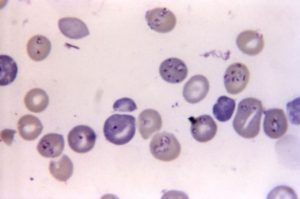BABESIOSIS
Babesiosis, most often referred to as Babesia, is considered one of the most tenacious and dangerous co-infections to Lyme Disease and is now one of the most common tick-borne co-infections.
Disclaimer: I am not a doctor and what I have stated here is only my opinion based on my research. Seek out a knowledgeable Lyme Literate Physician who can better help you. Visit ILADS
WHAT IS BABESIA
Babesia is caused by harmful parasitic microorganisms known as piroplasms. It is very much like malaria and infects the red blood cells.
STRAINS
There are more than one hundred strains of Babesia, mostly affecting the animal population. Only three strains have been found to affect people. Those strains are Babesia Microti, Babesia WA-1 (Babesia Duncani) and Babesia Divergens (found in Europe).

SYMPTOMS
Babesia can sometimes present in such a mild way that it goes undetected. However, when it is contracted by someone with multiple infections or an already compromised immune system it can become severe. Babesia can be fatal especially to those without their spleen.
Babesia is often misdiagnosed because doctors typically look for hemolytic anemia, jaundice, low platelet count, congestive heart failure and renal failure.
If doctors suspect Babesia they typically only test for strains that they believe are endemic to their specific area when in fact multiple strains of Babesia are found across the United States.
Babesia infections can cause the above symptoms but can also include any of the following:
* Fatigue, Malaise, Weakness, Fever
* Headaches (migraine-like and persistent)
* Shaking Chills
* Excessive Sweating (many times at night)
* Decreased Appetite
* Spleen and/or Liver Enlargement
* Capillary Angiomas
* Ear Ringing
* Blurry Vision
* Anxiety
* Nausea
* Hormone Imbalance
* Vasculitis (red skin with white patches)
* Jaw/Head/Neck Pain (stiffness & sometimes severe pain)
* Severe Muscle Pains (especially large muscle groups)
* Unexplained Cough
* Shortness of Breath
* Air Hunger.
* Lab abnormalities that may include low white blood count, low platelet counts, mild elevation of liver enzymes, and elevated “sed rate”.
Babesia exasperates typical Lyme symptoms and increases depression, anxiety, and mood swings. Left untreated, Babesia can cause severe disability as well as severe psychological disorders.
People with Babesia infections should avoid immune suppressing drugs such as steroids. The immune system is what will help to fight off the infection.
TRANSMISSION
Babesia spreads the same way Lyme disease does because it’s also transmitted by ticks, deer, and mice. It can be transmitted from person to person, from mother to unborn baby and has become a problem in the American Blood Supply. CDC Source: US Blood Supply Vulnerable To Parasitic Infection Spread By Ticks
Babesia is found throughout the United States and around the world. Babesia WA-1 Duncani is also found on the East Coast despite doctor’s believing it is only a West Coast disease.
TESTING
Testing is problematic because only specific strains of Babesia are looked for. If infected by a different strain, tests will come up negative. Many times a Babesia test will also come up negative if Lyme is the primary infection at the time or if the infection is mild. Blood smears are only reliable for the first two weeks of the infection.
More accurate tests include:
Immunofluorescent Antibody Assay (IFA)
Nucleic Acid Based Diagnostic Test (PCR and FISH)
For more information on testing please visit IGeneX and Imugen Labs
Energetic Testing may also be useful in diagnosing Babesia infections.
[bctt tweet=” Homeopathic and natural treatment modalities are showing promise in treating Babesia infections. #babesia #Lymedisease #awareness #tickbornedisease” username=”aboundinginhope”]
TREATMENT
If you suspect you have Babesia, it is necessary to seek out a Lyme Literate MD or ND. They can guide you to the appropriate testing, diagnosis, and treatment. Standard antibiotic treatments for Lyme will not work to treat Babesia. Anti-parasitic medication along with specific antibiotics are necessary. Doctors are finding that multiple treatment options are best for treating Babesia because standard treatments using Mepron and Azithromycin no longer work the way they once did.
Homeopathic and natural treatment modalities are also showing promise in treating Babesia infections.
FURTHER STUDY
Lyme Disease.org Co-Infections
Pangaea Clinic of Naturopathic Medicine Babesia Coinfection and Treatment of Lyme
Good Bye Lyme.com Why You Need These Herbs For Fighting Drug-resistant Babesia
Buhner Healing Lyme Protocols for Babesia
Psychology Today Babesia The Malaria Disease In Your Yard
SOURCES: (Content below contains affiliate links. See my disclosure statement)
Why Can’t I Get Better, Dr. Richard Horowitz
The Lyme Disease Solution, Kenneth B. Singleton, M.D., M.P.H



Leave a Reply